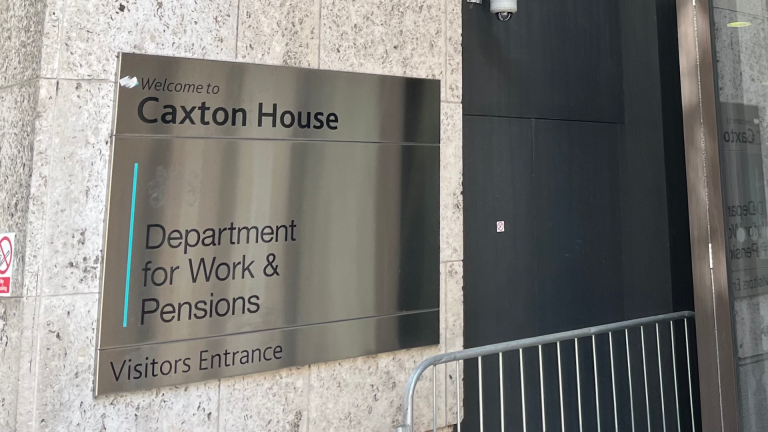It said the disability benefits bill is rising at an “unsustainable rate” because the number of people claiming for mental health conditions has soared.
Mel Stride, secretary for work and pensions, said: “We are rolling out the next generation of welfare reforms so that thousands more people can gain all the benefits work brings.
“Too many today are falling out of work in a spiral of sickness that harms their finances, their prospects and ultimately their health, where with the right workplace adjustments and help, this needn’t be the case.
“And so we have designed WorkWell, a groundbreaking new service, that will for the first time integrate health and work advice at the local level, as part of our plan to stem the flow into economic inactivity, grow the economy, and change lives for the better.”
The DWP plans to deliver personalised “work and health plans that prevent people from falling out of work and onto long-term sickness benefits“.
Big Issue is demanding an end to poverty this general election. Will you sign our open letter to party leaders?
Advertising helps fund Big Issue’s mission to end poverty
Participants in the WorkWell scheme will not need to be claiming any benefits. They can either self-refer or be referred by a professional and will receive personalised support from a work and health coach to understand their barriers to work and draw up a plan to help them overcome them.
These coaches will also provide advice on workplace adjustments, such as flexible working or adaptive technology, facilitate conversations with employers on health needs, and provide access to local services such as physiotherapy, employment advice and counselling.
Helen Barnard, director of policy, research and impact at the Trussell Trust, posted on X: “The WorkWell programme is a really good initiative, exactly the direction the government should be going in. But it’s getting swamped both in financial and rhetorical terms by poorly grounded, harsh, evidence-free rhetoric.”
The government has outlined concerns about soaring rates of economic inactivity due to long-term sickness, but as it points out, there is a near record level of people on company payrolls, up by over 200,000 since last year. Wages have risen for nine months in a row, and economic inactivity is still lower than in the US, France and Italy.
WorkWell funding will give private partner firms the “capacity to join up the work and health landscape at a local level” – including trialling “new ways to provide individuals receiving a fit note”.
Rishi Sunak has previously announced plans to trial stripping GPs of their power to sign people off work.
Advertising helps fund Big Issue’s mission to end poverty
James Taylor, executive director of strategy and social change at disability equality charity Scope, said: “All government back to work support for disabled people should be personalised and voluntary.
“Disabled people are pushing hard to get jobs and there a million disabled people who want to work but are denied the opportunity. It’s the government’s job to get this right. It’s crucial that this scheme remains voluntary, and that disabled people don’t face undue pressure to take part.
“Though there remain concerns that this scheme is being used as a fig leaf to make welfare cuts more palatable to the public. Much of the current record levels of inactivity are because our public services are crumbling, the quality of jobs is poor and the rate of poverty amongst disabled households is growing.
“The next government needs to find solutions for our broken benefits system, why life costs more if you are disabled, and why it’s so difficult for disabled people to get in work, stay in work and thrive in work. Disabled people deserve an equal future.”
It comes as disabled people’s organisations, activists and other grassroots groups – led by Disability Rights UK – have written to the prime minister to “condemn the recent onslaught of attacks from the government on disabled people’s rights”.
Ken Butler, welfare rights advisor at Disability Rights UK said: “No matter your background, no one should be left without a financial safety net that means we can live independent lives. We all want the right support when we need it, but since 2008, changes to the benefits system have led to this safety net failing, causing people to feel abandoned by a cruel and unfair system.
Advertising helps fund Big Issue’s mission to end poverty
“The government is spending £64m on a new scheme, so people can stay or return to work. But what if their work environment and or job demands have made them ill in the first place? What if they have a serious condition that prevents them from working? Can WorkWell force a change?
“If the government is serious about improving job retention for disabled people or those with long term health conditions, money might be better spent on ensuring that employers implement reasonable adjustments required by the Equality Act and by helping people to get the NHS services they need by reducing waiting lists.”
Disability campaigner who goes by the name of Ben Claimant said: “The DWP want to force more and more disabled people into unsuitable work that pays no attention to their needs. Last week, evidence to MPs revealed that the number of jobs disabled people could do from home was far less than the government suggests.
“The government talks about a million job vacancies but only a tiny fraction are suitable for sick and disabled people. Many disabled people will see this WorkWell pilot as a further attack.”
Ben Claimant also raised concerns over staffing, as the DWP already faces a “recruitment problem” with thousands of positions going unfilled.
Tom Marsland, policy manager at the national disability charity Sense, said: “We will watch with interest to see if the new WorkWell programme helps people with complex disabilities stay in work. While it’s good to see some new support being put in place, our fear is that it won’t do nearly enough to tackle the deep-rooted barriers so many disabled people face in the workplace.”
Advertising helps fund Big Issue’s mission to end poverty
Recent research by Sense found that more than half (52%) of people with complex disabilities in work said they’d taken a less challenging role because their needs are not being met.
“That is a shocking waste of talent,” Marsland added. “We also know that disabled people struggle to find a job in the first place. Barriers like unfair recruiting practices and a complete lack of specialist assistive technology in job centres stand in their way.
“Half of jobseekers with complex disabilities have told us they don’t feel they have the support they need to find work. We urge the government to do more – much more – to tackle these fundamental issues.”
The government has targeted those with mental health conditions claiming disability benefits, with the DWP’s Mel Stride suggesting people with depression and anxiety could lose access to PIP.
Jan Hutchinson, director of operations at Centre for Mental Health, said: “We’re pleased that WorkWell will provide extra support for people with ongoing health conditions who want to return to work or keep their job.
“We know that intensive personalised support – such as individual placement and support (IPS) – makes a big difference in overcoming barriers to work. The difficulty for short-term programmes is often in attracting appropriately trained and experienced staff.
Advertising helps fund Big Issue’s mission to end poverty
“It remains to be seen whether promises of in-house access to physiotherapists and counsellors can be delivered, given the limited funding provided. To be successful, WorkWell should establish good local networks, closely linked with the NHS and IPS providers, to create new pathways for people who want to be in work.”
Do you have a story to tell or opinions to share about this? We want to hear from you. Get in touch and tell us more.










